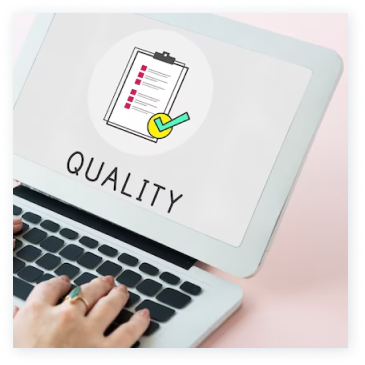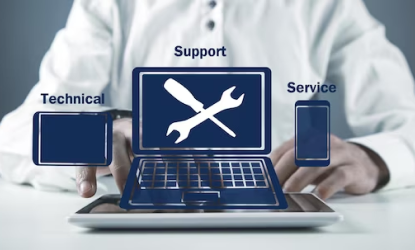
Are you looking to expand your e-commerce business and increase your sales? Eritheia Labs offers custom marketplace development services to help take your business to the next level. With our expertise, we can create a platform that is tailored to your specific needs and goals. Contact us today to learn more about how we can help you succeed in the competitive world of e-commerce. Market development can be a complicated, multi-faceted technical need. The successes at Amazon, Airbnb, Etsy, and other marketplaces all point to aligning the marketplaces' formats to improve your business. We do not just manage your tech needs; we help you turn your concept into a sustainable company, providing practical guidance and concrete ideas throughout the process. Our Marketplace services offer a complete solution, such as TaskRabbit app development, from initially conceptualizing the idea to implementing it and launching it. Our zero-hiccup development process guarantees that your experience is secure, transparent, and predictable. We help businesses make online marketplace apps that work well so that you can make money from your idea within six months. We have a team of professionals devoted to providing support and helping users. They can help you with growth hacking and web scraping, editing images of products, product catalogue management, information entry, listing and uploading products, SEO, and much more. Companies are using markets to offer superior and better services to customers. It's a tried-and reliable method of establishing an image of importance for a brand and allowing the business to grow.
What Is a Marketplace, exactly?
A typical marketplace model has sellers and buyers, and the platform connects them. Marketplaces are not typically the owners of any inventory, don't offer services or products directly, and (eventually) manage the exchange of money. As already said, a marketplace is where people can quickly meet and do business. There are a lot of moving parts in a marketplace, such as the user's identity, the reputation of the participant, payment, safety, trust, transparency, and the lack of friction. The founder is in charge of creating opportunities that solve problems for both buyers and sellers by being effective, scalable, flexible, and having network effects. Marketplaces can take time to establish. At the beginning of a market, there isn't any demand or supply. At Eritheia Labs, we work with entrepreneurs to assist with technology and develop the appropriate business strategy with the assistance of our market development services. To launch a marketplace, you must build both sides of the market. On the one hand, you need to take on the buyers, while on the other side, you need to take on the sellers.
Difference between marketplace and e-commerce store?
A marketplace is a platform where multiple sellers offer their products or services for sale to a large pool of buyers. The marketplace operator manages the platform and provides services such as payment processing, customer service, and marketing. Examples of marketplaces are Amazon, eBay, and Etsy. An e-commerce store, on the other hand, is a standalone online retail website owned and operated by a single seller. The seller is responsible for managing all aspects of the store, including product listings, payments, shipping, and customer service. Examples of e-commerce stores are Shopify, Magento, and WooCommerce. The key difference between a marketplace and an e-commerce store is that a marketplace allows multiple sellers to offer their products and services to a large pool of buyers, while an e-commerce store is owned and operated by a single seller. This means that a marketplace offers a wider variety of products and services, while an e-commerce store is focused on a single brand or product line. Also, marketplaces usually offer more services, like processing payments and helping customers, while e-commerce stores rely on the seller to handle these parts of the business.
Cost of Developing a Marketplace App
To create a marketplace, you need an entire team comprising designers, front-end and back-end engineers, DevOps experts, technical leads, testers, and an Agile Scrum manager. A group of seven to seven people and an average burn rate of 20K USD per month can create an MVP within six months. The exact price and timeframe differ based on the requirements. It is possible to seek the help of a mobile app development firm and develop a marketplace. Using freelance developers, open-source software, or general website builders could be a good option, but it comes with its own risks in terms of availability, scalability, and reliability. A similar exercise to a Design Sprint can be carried out at the beginning to define the final user experience and flow and establish the priorities for the platform development phase. With a solid foundation in place, there will be less chance that the project's goals, expectations, or quality will change.
How Does a Marketplace Function?
Marketplaces allow vendors to present their products and services to the customers they want to reach. Customers can choose from different options on multi-vendor platforms, and the number of sellers can go up a lot. The greatest benefit of marketplaces is their network effect. More buyers will create more sellers, leading to more buyers, and so on. Once a system is in place, it becomes difficult to compete and provides a considerable advantage to the company.
Why build a custom e-commerce marketplace?
Building a custom e-commerce marketplace can provide numerous benefits for businesses. By creating a platform that is tailored to your specific needs and goals, you can improve the user experience for your customers, increase sales, and ultimately boost your bottom line. A custom marketplace can also help you stand out from competitors and establish your brand as a leader in your industry. Contact Eritheia Labs today to learn more about how they can help you build a custom e-commerce marketplace that drives results.
Benefits Of a Custom Marketplace
How can Eritheia Labs help you build your own marketplace?
Customizable platform
Eritheia Labs offers a customizable platform that allows you to build your own marketplace according to your specific needs. You can choose from a range of features and functionalities to create a unique marketplace that meets your business requirements.
Easy integration
Eritheia Labs provides easy integration with third-party tools and services, such as payment gateways, shipping providers, and marketing tools. This makes it easy for you to manage your marketplace and streamline your operations.
Scalable solution
Eritheia Labs offers a scalable solution that can grow with your business. Whether you are just starting out or have an established business, Eritheia Labs can provide a solution that meets your needs and can adapt to your changing requirements.
Robust security
Eritheia Labs provides robust security features to ensure that your marketplace is safe and secure. This includes SSL encryption, two-factor authentication, and regular security updates to protect against potential threats.
Analytics and reporting
Eritheia Labs provides analytics and reporting tools that allow you to track your marketplace's performance and make data-driven decisions. You can monitor sales, traffic, and customer behavior to optimize your marketplace and improve your business outcomes.
Dedicated support
Eritheia Labs offers dedicated support to help you build and manage your marketplace. Their team of experts can provide guidance and assistance throughout the process, from initial setup to ongoing maintenance and support.
Affordable pricing
Eritheia Labs offers affordable pricing plans that are tailored to your specific needs. Whether you are a small business or a large enterprise, Eritheia Labs can provide a solution that fits your budget and helps you achieve your business goals.
We at Eritheia Labs have created marketplaces for over ten years and have taken charge of all marketplace aspects, from conception to implementation. Our Marketplace Development Services have helped many startups launch their business ideas. With a strong design team and a strong background in the latest technologies, we provide an all-encompassing service to our clients.
Mobile Commerce (mCommerce) Development by Eritheia Labs


Responsive Design
One of the most important aspects of mCommerce development is responsive design. This means that your website or app should be able to adapt to different screen sizes and resolutions. This is crucial because more and more people are using their mobile devices to shop online, and if your website or app is not optimized for mobile, you could be missing out on a lot of potential customers.


User Experience
User experience (UX) is another important factor in mCommerce development. Your website or app should be easy to navigate, with clear and concise menus and buttons. It should also be fast and responsive, with quick load times and minimal lag. A good UX will keep your customers engaged and coming back for more.


Payment Integration
Payment integration is another crucial aspect of mCommerce development. Your website or app should be able to accept a variety of payment methods, including credit cards, PayPal, and mobile payment options like Apple Pay and Google Wallet. This will make it easier for your customers to make purchases and will increase the likelihood of them completing the transaction.


Security
Security is always a concern when it comes to online transactions, and mCommerce is no exception. Your website or app should be secure, with SSL encryption and other security measures in place to protect your customers' personal and financial information. This will help to build trust and confidence in your brand, and will encourage customers to make repeat purchases.


Push Notifications
Push notifications are a great way to keep your customers engaged and informed about new products, sales, and other promotions. They can be used to send personalized messages to customers based on their browsing and purchasing history, and can help to increase customer loyalty and retention.


Analytics
Analytics are an important tool for mCommerce development, as they can provide valuable insights into customer behavior and preferences. By tracking metrics like page views, bounce rates, and conversion rates, you can identify areas for improvement and optimize your website or app for better performance.


Social Media Integration
Social media integration is another important aspect of mCommerce development. Your website or app should be integrated with popular social media platforms like Facebook, Twitter, and Instagram, allowing customers to share products and promotions with their friends and followers. This can help to increase brand awareness and drive more traffic to your website or app.
Product Catalog Management
Enhance E-Commerce Efficiency
Eritheia Labs is dedicated to enhancing e-commerce efficiency through their comprehensive product catalog management services. With their expertise, businesses can streamline and optimize their product data, ensuring accurate and up-to-date information across their e-commerce marketplace. Eritheia Labs employs robust tools and strategies to centralize and organize product data, simplifying the process of product listing and updates. By leveraging their services, businesses can improve customer experience, drive sales, and boost conversion rates. Eritheia Labs' focus on efficient catalog management enables businesses to stay competitive in the fast-paced e-commerce landscape, maximizing product discoverability, and achieving seamless operations for sustainable growth.
Centralize and Organize Your Product Data
Eritheia Labs specializes in centralizing and organizing product data to ensure seamless management of e-commerce marketplaces. With their expertise, businesses can efficiently manage and maintain large volumes of product information. Eritheia Labs employs advanced tools and methodologies to create a centralized repository for product data, enabling businesses to easily access and update information across multiple channels. By centralizing product data, businesses can ensure consistency, accuracy, and improve the overall quality of their product listings. Eritheia Labs' commitment to seamless e-commerce marketplace management empowers businesses to streamline operations, enhance customer experience, and drive revenue growth through well-organized and easily manageable product data.
Drive Sales and Conversion Rates
Effective product catalog management plays a crucial role in driving sales and boosting conversion rates, and Eritheia Labs excels in this area. With their expertise, businesses can optimize their product catalogs to enhance customer engagement and increase sales. Eritheia Labs employs strategies such as accurate product categorization, compelling product descriptions, and visually appealing imagery to create a captivating shopping experience. By ensuring that product information is up-to-date, easily accessible, and well-organized, Eritheia Labs helps businesses build trust with customers and facilitate confident purchasing decisions. Their focus on effective product catalog management empowers businesses to maximize sales and conversion rates, ultimately leading to increased revenue and sustained growth in the competitive e-commerce market.
Benefits of Product Catalog Management
Product catalog management offers numerous benefits to businesses in the e-commerce industry. Firstly, it ensures accurate and up-to-date product information, which enhances the customer experience and builds trust. Effective catalog management enables businesses to organize and categorize products systematically, making it easier for customers to find what they need. It also facilitates efficient inventory management, ensuring that stock levels are accurately reflected in the catalog. With streamlined catalog management, businesses can quickly add new products, update pricing, and manage promotions, resulting in improved agility and faster time-to-market. Moreover, a well-managed product catalog improves search engine visibility, drives organic traffic, and boosts conversion rates. Ultimately, effective product catalog management leads to increased sales, customer satisfaction, and overall business growth.
Inventory Management
Product Catalog Management integrates with inventory management systems, providing real-time visibility into stock levels. You can track and update inventory quantities, set alerts for low stock, and manage backorders. This ensures accurate product availability information for customers.
Product Data Enrichment
Catalog management systems offer tools to enrich your product data. This includes adding SEO-friendly meta information, optimizing product descriptions for search engines, and incorporating rich media elements such as videos or 360-degree images to enhance the product presentation.
Pricing and Promotions
With catalog management, you can easily manage product pricing, discounts, and promotions. You can set up special pricing for specific customer groups or implement time-limited promotional offers to drive sales.
Multichannel Publishing
A robust catalog management system enables you to publish your product catalog across multiple sales channels, including your e-commerce website, marketplaces, social media platforms, and mobile apps. This ensures consistency in product information and availability across different touch points.
Localization and Globalization
If you sell internationally, catalog management systems support localization and globalization. You can manage product information in multiple languages, adapt pricing for different regions, and handle country-specific regulations or tax requirements.
Analytics and Insights
Catalog management systems provide valuable analytics and insights on product performance, customer preferences, and sales trends. This helps you make data-driven decisions to optimize your product offerings, pricing strategies, and marketing campaigns.
Integration Capabilities
Catalog management systems can integrate with other business systems such as ERP (Enterprise Resource Planning), CRM (Customer Relationship Management), and order management systems. This streamlines processes and ensures seamless data flow across your entire business ecosystem.
Importance of E-Commerce Payment Gateway Integration
Payment gateways play a crucial role in the success of an e-commerce business, and Eritheia Labs recognizes their importance in facilitating secure and seamless online transactions. Here are the key reasons why Eritheia Labs emphasizes the significance of payment gateways:
Secure Transactions
Eritheia Labs understands that customer trust is paramount in e-commerce. Payment gateways provide robust security measures such as encryption and tokenization to protect sensitive payment information. By implementing secure payment gateways, Eritheia Labs ensures that customers' financial data remains protected, instilling confidence in their online shopping experience.
Payment Options
Eritheia Labs acknowledges the importance of offering diverse payment options to cater to the preferences of customers. Payment gateways integrate with various payment methods, including credit cards, debit cards, e-wallets, and bank transfers. This flexibility enhances the convenience for customers, ultimately leading to increased sales and customer satisfaction.
Seamless User Experience
Eritheia Labs recognizes that a smooth and seamless checkout process is vital for converting visitors into paying customers. Payment gateways enable a streamlined and intuitive payment flow, reducing friction and potential cart abandonment. By prioritizing user experience, Eritheia Labs ensures a positive customer journey from product selection to payment completion.
Faster Payment Processing
Eritheia Labs understands that efficient payment processing is essential for business operations. Payment gateways facilitate swift authorization and settlement of transactions, ensuring that funds are transferred promptly to the merchant's account. This accelerates cash flow and enables Eritheia Labs to efficiently manage financial transactions.
Integration Capabilities
Eritheia Labs acknowledges the importance of seamless integration between the payment gateway and other business systems. Payment gateways can integrate with e-commerce platforms, inventory management systems, and accounting software, allowing for streamlined data synchronization and reporting. This integration enhances operational efficiency and provides a comprehensive view of sales and financial data.
Fraud Prevention:
Eritheia Labs recognizes that online payment fraud is a significant concern for businesses and customers alike. Payment gateways employ advanced fraud detection and prevention mechanisms, including real-time transaction monitoring and machine learning algorithms. By leveraging these features, Eritheia Labs minimizes the risk of fraudulent transactions, protecting both the business and its customers.
Compliance and Regulation
Eritheia Labs understands the importance of adhering to industry regulations and compliance standards. Payment gateways ensure compliance with Payment Card Industry Data Security Standard (PCI DSS) requirements, reducing the legal and financial risks associated with handling sensitive payment information.
Process of Payment Gateway Integration
Payment Gateway Integration involves integrating a payment gateway into a website or application. This is typically done using an API (Application Programming Interface) provided by the payment gateway provider. The API allows the website or application to communicate with the payment gateway and process transactions securely.
Eritheia Labs specializes in E-commerce marketplace development, providing customized solutions tailored to your unique business requirements. Our team of experts is adept at designing and developing e-commerce marketplaces that cater to your specific needs. Whether you require a new marketplace application or the integration of an e-commerce store into your existing infrastructure, we have the expertise to deliver. We understand the intricacies of building successful marketplaces and leverage our experience to create web applications that drive growth and enhance user experiences. Partner with Eritheia Labs for E-commerce marketplace development and let us transform your vision into a robust and scalable solution.
Why Eritheia Labs for Marketplace Development Services?
Expertise in Marketplace Development
Eritheia Labs has a team of experienced developers who specialize in marketplace development. They have a deep understanding of the complexities involved in building a successful marketplace and can provide customized solutions to meet the unique needs of each client.
Customized Solutions
Eritheia Labs understands that every business is unique and has different requirements. They provide customized solutions that are tailored to the specific needs of each client. This ensures that the marketplace is built to meet the exact requirements of the business and its customers.
Agile Development Methodology
Eritheia Labs follows an agile development methodology that allows for flexibility and adaptability throughout the development process. This means that changes can be made quickly and efficiently, ensuring that the marketplace is built to the highest standards and meets the needs of the business.
Quality Assurance
Eritheia Labs places a strong emphasis on quality assurance. They have a dedicated team of testers who ensure that the marketplace is thoroughly tested and meets the highest standards of quality. This ensures that the marketplace is reliable, secure, and user-friendly.
Ongoing Support
Eritheia Labs provides ongoing support to ensure that the marketplace continues to function smoothly and efficiently. They offer maintenance and support services to ensure that any issues are resolved quickly and efficiently, minimizing downtime and ensuring that the marketplace is always available to customers.
Competitive Pricing
Eritheia Labs offers competitive pricing for their marketplace development services. They understand that businesses need to keep costs under control, and they work closely with clients to ensure that the project is delivered within budget.
Customer Satisfaction
Eritheia Labs places a strong emphasis on customer satisfaction. They work closely with clients to ensure that their needs are met and that the marketplace is built to the highest standards. They have a proven track record of delivering successful marketplace development projects and have many satisfied customers.
How to do Custom E-commerce Marketplace Development
E-commerce Analytics and Reporting
Understanding E-commerce Analytics
E-commerce analytics is the process of collecting, analyzing, and interpreting data from an online store to gain insights into customer behavior, sales trends, and overall performance. It involves tracking metrics such as website traffic, conversion rates, and revenue to make data-driven decisions that can improve the store's profitability.
Key Metrics to Track
There are several key metrics that e-commerce businesses should track to gain a better understanding of their performance. These include website traffic, bounce rate, conversion rate, average order value, and customer lifetime value. By tracking these metrics, businesses can identify areas for improvement and make data-driven decisions to optimize their store's performance.
Tools for E-commerce Analytics
There are several tools available for e-commerce analytics, including Google Analytics, Shopify Analytics, and WooCommerce Analytics. These tools provide businesses with valuable insights into their store's performance, including traffic sources, customer behavior, and sales trends. By using these tools, businesses can make data-driven decisions to improve their store's performance and increase revenue.
Reporting and Visualization
Reporting and visualization are essential components of e-commerce analytics. By creating reports and visualizations, businesses can easily communicate their store's performance to stakeholders and make data-driven decisions. Reports can be created using tools such as Google Data Studio, while visualizations can be created using tools such as Tableau or Power BI.
Importance of E-commerce Analytics
E-commerce analytics is essential for businesses that want to optimize their online store's performance and increase revenue. By tracking key metrics, businesses can identify areas for improvement and make data-driven decisions to optimize their store's performance. E-commerce analytics also provides businesses with valuable insights into customer behavior, which can be used to improve the customer experience and increase customer loyalty.
User Experience (UX) Design for E-commerce Platforms
Simplify Navigation
One of the most important aspects of UX design for e-commerce platforms is simplifying navigation. Users should be able to easily find what they are looking for without having to click through multiple pages. Use clear and concise categories and subcategories to organize products and make it easy for users to find what they need.
Optimize Search Functionality
Search functionality is another critical aspect of UX design for e-commerce platforms. Users should be able to easily search for products using keywords, filters, and sorting options. Make sure the search bar is prominently displayed and easy to use.
Streamline Checkout Process
The checkout process should be as streamlined as possible to reduce cart abandonment rates. Use a progress bar to show users how far along they are in the checkout process, and allow them to easily edit their cart before finalizing their purchase. Offer multiple payment options and make sure the checkout page is secure.
Use High-Quality Product Images
High-quality product images are essential for e-commerce platforms. Users want to see what they are buying, and clear, high-resolution images can help them make informed purchasing decisions. Use multiple images from different angles and allow users to zoom in for a closer look.
Provide Detailed Product Descriptions
Detailed product descriptions are also important for e-commerce platforms. Users want to know exactly what they are buying, and detailed descriptions can help them make informed decisions. Include information such as product dimensions, materials, and care instructions.
Offer Personalization Options
Personalization options can enhance the user experience on e-commerce platforms. Allow users to customize products with different colors, sizes, and other options. Use data to personalize product recommendations and offer personalized promotions and discounts.
Optimize for Mobile Devices
More and more users are shopping on mobile devices, so it's essential to optimize e-commerce platforms for mobile. Use responsive design to ensure that the platform looks and functions well on all devices. Make sure buttons and links are easy to tap, and minimize the need for scrolling and zooming.
E-commerce Platform Migration and Upgrades






Order Management and Fulfillment
Understanding Order is the process of receiving, processing, and fulfilling customer orders. It involves managing inventory, tracking orders, and ensuring timely delivery. A well-managed order management system can help businesses streamline their operations and improve customer satisfaction.
Importance of Order Fulfillment
Order fulfillment is the process of delivering products to customers after they have placed an order. It is a critical part of the order management process and can impact customer satisfaction and loyalty. A well-executed order fulfillment process can help businesses build a positive reputation and increase customer retention.
Inventory Management
Effective inventory management is crucial for successful order management and fulfillment. It involves tracking inventory levels, monitoring product demand, and ensuring that products are available when customers place orders. Businesses can use inventory management software to automate this process and reduce the risk of stockouts or overstocking.
Order Tracking
Order tracking is an essential part of order management and fulfillment. It involves providing customers with real-time updates on the status of their orders, including shipping and delivery information. This can help businesses build trust with their customers and improve the overall customer experience.
Shipping and Delivery
Shipping and delivery are critical components of order fulfillment. Businesses must ensure that products are shipped and delivered on time and in good condition. They can use shipping software to automate this process and provide customers with tracking information.
Returns and Refunds
Returns and refunds are an inevitable part of the order management process. Businesses must have a clear policy in place for handling returns and refunds, including how to process returns, issue refunds, and restock inventory. A well-managed returns process can help businesses retain customers and improve their reputation.
Customer Service
Customer service is a critical component of order management and fulfillment. Businesses must provide timely and effective customer support, including answering questions, resolving issues, and providing updates on order status. A positive customer service experience can help businesses build customer loyalty and increase sales.
Ready to take your e-commerce business to the next level? Contact Eritheia Labs today to learn more about how we can help you build a custom marketplace that drives sales and boosts your bottom line. Our team of experienced developers and designers will work with you to create a unique shopping experience that meets the specific needs of your business and your customers. From design and functionality to payment and shipping options, we'll help you create a platform that sets you apart from your competitors and builds brand loyalty. Don't wait; contact us today to get started.
Faqs
You Ask, We Answer
Newsletter to recieve
our latest company updates































































